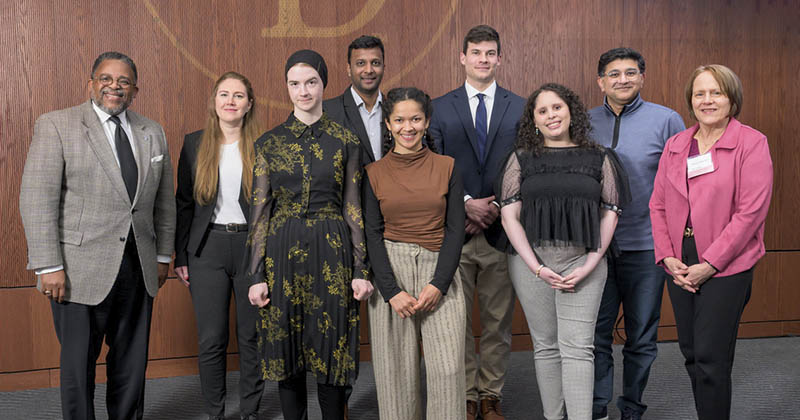
Doctoral Programs
earn a PHD from the Biden School
Doctoral students at the Joseph R. Biden, Jr. School of Public Policy and Administration at the University of Delaware work side-by-side with leading scholars and practitioners to become first-rate researchers.
Our graduates tackle today's biggest challenges.
Our PhD programs, our world-class faculty, and our research and service centers together offer a wide range of opportunities for interdisciplinary collaborations, applied research, and community engagement.
Why Study at the Biden School?
- Our interdisciplinary programs span the social, natural, and engineering sciences. Doctoral students train with sociologists, physicists, geographers, and other researchers for broad exposure in their field.
- We offer one-on-one faculty mentoring from day one. Students engage in small, flexible programs personalized to their academic goals.
- Our doctoral students conduct academic, applied, and engaged research to prepare for careers in academia, government, nonprofits, or industry.
- The Biden School offers all doctoral students five years of funding, including summer.
doctoral programs
STUDENT STORIES
The Biden School is proud to host doctoral students with diverse professional backgrounds, experiences, and academic goals.
join our community
Our doctoral students gain experience conducting research with policymakers, practitioners, and community stakeholders. We connect you with faculty, research centers, and University of Delaware initiatives across campus in your substantive areas of interest.
All full-time Biden School doctoral students receive five years of funding support. This includes a research assistantship stipend and a 100% tuition scholarship.
Biden School doctoral students can apply for competitive funding for:
- Conference travel
- Summer and winter session support
- Study and/or research abroad
- Special equipment and support for dissertation research
- Prestigious university-wide scholarships and fellowships
Funding support packages include University-subsidized student health insurance, dental, and prescription coverage.
The Biden School offers the following professional development opportunities to its doctoral students in addition to University-led programs which cover:
- CV and academic bio workshop
- Presenting and talking about your work
- Preparing for research careers
- Funding, research, and training opportunities
- Preparing for the academic job market
- Academic publishing
Additional opportunities for doctoral students include:
start your application
- Apply online with the UD Graduate College
- Fill out the Biden School supplemental application form below if applicable
- Gather relevant documents to upload, including a writing sample, preferably a Master’s thesis or research paper
- Submit your application
doctoral Admissions Deadlines
- Fall Admission Only
- December 15 (priority deadline)
ADMISSIONS FAQs
- The Biden School does not require the GRE for admission to the disaster science and management or public policy and administration programs.
- GRE test scores are optional for admission to the energy and environmental policy program.
- GRE test scores are required for admission to the education and social policy program.
- The Biden School accepts the minimum English proficiency test scores listed in the Graduate Admissions Test scores section.
The UD Graduate College and the Biden School cannot waive fees solely based on financial hardship.
UD Graduate College Application Fee Waiver: Please see if you qualify for a Graduate College fee waiver here.
- Scroll down the page until you come to Application Fee Waivers. Click the “+” sign for more information.
- Questions regarding applying for a Graduate College-issued application fee waiver should be directed to Graduate Admissions at gradadmissions@udel.edu.
Biden School Application Fee Waivers: If you do not meet Graduate College criteria for an application fee waiver, then you may be eligible for a fee waiver through the Biden School.
Waivers are granted based on the Biden School goals below:
- Recognizing exceptional student achievement and merit.
- Increasing social mobility by supporting first-generation college students.
- Expanding the diversity of our student body by encouraging applicants who bring unique perspectives shaped by life experiences.
- Expanding our cultural and experiential diversity by enrolling individuals with significant work experience, applied expertise, international perspectives, or military service.
Search by keyword to explore faculty profiles, research and areas of focus. Contacting faculty before you apply to a doctoral program is not required.
Learn about how faculty, researchers and students at the Biden School work together on critical issues.
get to knoW the biden school faculty and their work
Biden School faculty embraces the “Delaware Model” of integrating research, teaching, and public service to prepare graduates to impact communities locally and globally. Our faculty are productive scholars, excellent teachers, and skilled practitioners with decades of experience in their field.

Request Information
Want to learn more about a graduate program with the Biden School? Fill out the form below and we will be in touch.



